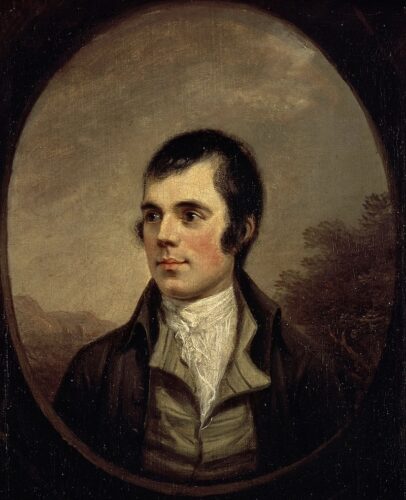
Oidhche Bhlas Burns! That’s “Happy Burns Night” in Gaelic.
If you are Scottish or have Scottish ancestry, you will probably be aware that Jan. 25 is Burns Night — and that in turn means you will be celebrating with a Burns Supper. We are pretty confident a few of these will be held in Lyme or Old Lyme tonight or in the next few days! In case you are attending one for the first time, people traditionally greet each other at a Burns Supper with the phrase Sláinte Mhath! which translates to ‘Good Health!” and is pronounced “slanj’-uh va’”.
But who was Robert — also known as Rabbie — Burns? Well, he is widely regarded as the national poet of Scotland but was undoubtedly a man whose genius was only widely recognized after his death. His life was tragically short but had a remarkable impact.
Quoting from the website Scotland.org, “In his short life, Burns wrote hundreds of poems and songs that would become cherished throughout the world. His words would reach far beyond his native Scotland and continue to resonate over two centuries later with words about the human spirit and condition, about nature, love, life and death that are as meaningful now as they were in Burns’ time.”
Probably his most famous poem is the traditional New Year’s song, Auld Lang Syne, which is sung all over the world—although very few people know the song has multiple verses! He also wrote the immortal, ‘Address to a Haggis.”
Traditionally Burns Night is celebrated with a classic Burns Supper combination of haggis, neeps [turnips], tatties [mashed potatoes], some reciting of poetry, and maybe even a warming dram [of whisky].”
Burns was born on Jan. 25, 1759 and died at the age of only 37 on July 21, 1796 from a form of rheumatic fever, which would have been treatable today.
The Scotland.org website has a section titled The Life of Robert Burns: Scotland’s Bard . The following quotes about the life and work of Burns are all taken from that section of the website.
Burns “was the eldest of seven children … [His] parents were small tenant farmers. William and his wife, Agnes, struggled to make a living on poor soil. But despite their hardships they were keen to educate their offspring.”
“He [Burns] had lived in near poverty most of his life and been engaged in heavy physical farm work since he was a young boy, in a harsh climate and on a very limited diet … By the time he was 21 he had read Shakespeare, David Hume, his favourite philosopher Adam Smith and everything in between.”
“Burns fathered over a dozen children to various women, and his sexual behavior was radical, especially in 18th century society.”
“[He] acknowledged women as individuals who had valuable insights and opinions and were stimulating.”
“Burns’ poems touched on themes of injustice, hypocrisy, the hard life of the countryman, radicalism, anticlericalism, sexuality, gender roles, Scottish cultural identity and man’s inhumanity to his fellow man. He wrote scathing satires and tender love songs delivered in a direct, playful, yet sympathetic voice that spoke to all walks of life.”
“Throughout his life, Burns was on the side of the poor and the downtrodden and was always anxious to speak up for them. Inequality made him angry. He was an enthusiastic supporter of the French revolution in 1789 before it turned into a bloodbath and supported the American struggle for democracy led by George Washington.”
Learn more about the intriguing and remarkable life of Robert Burns at this link.